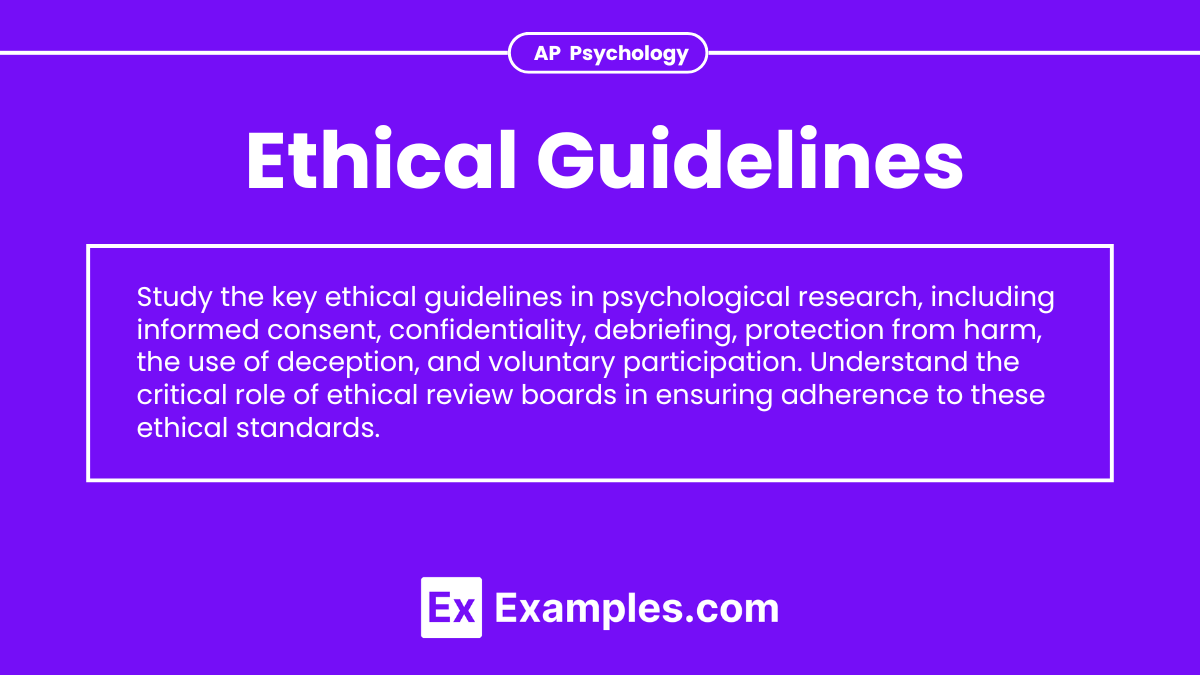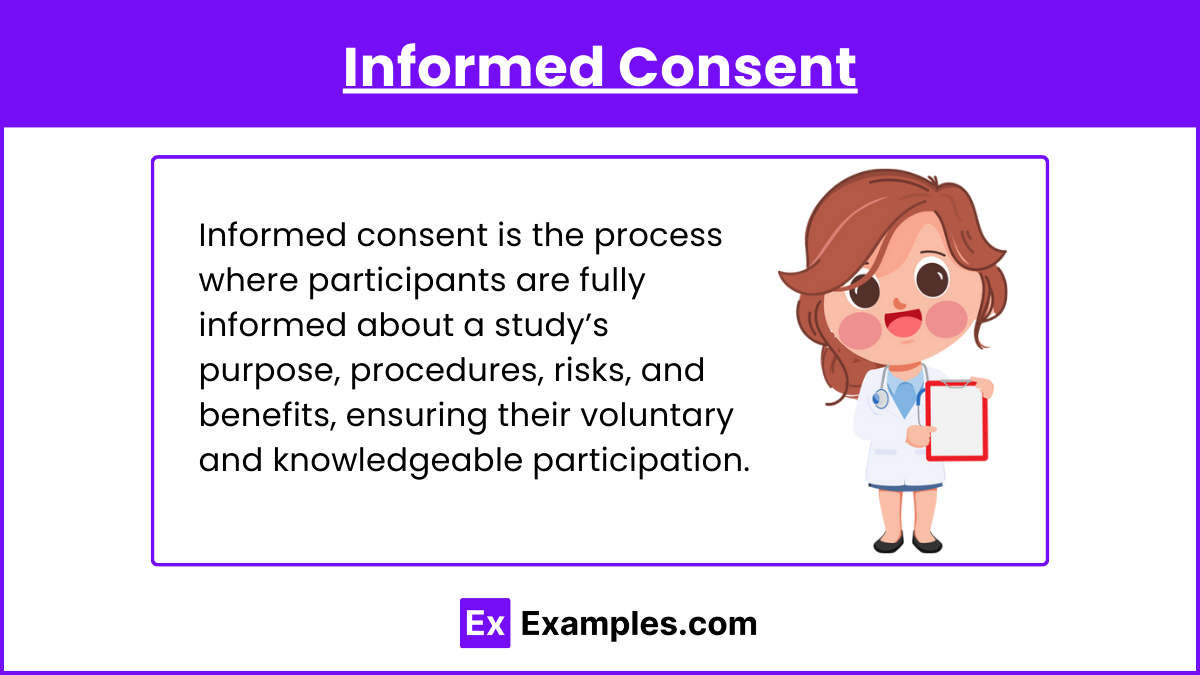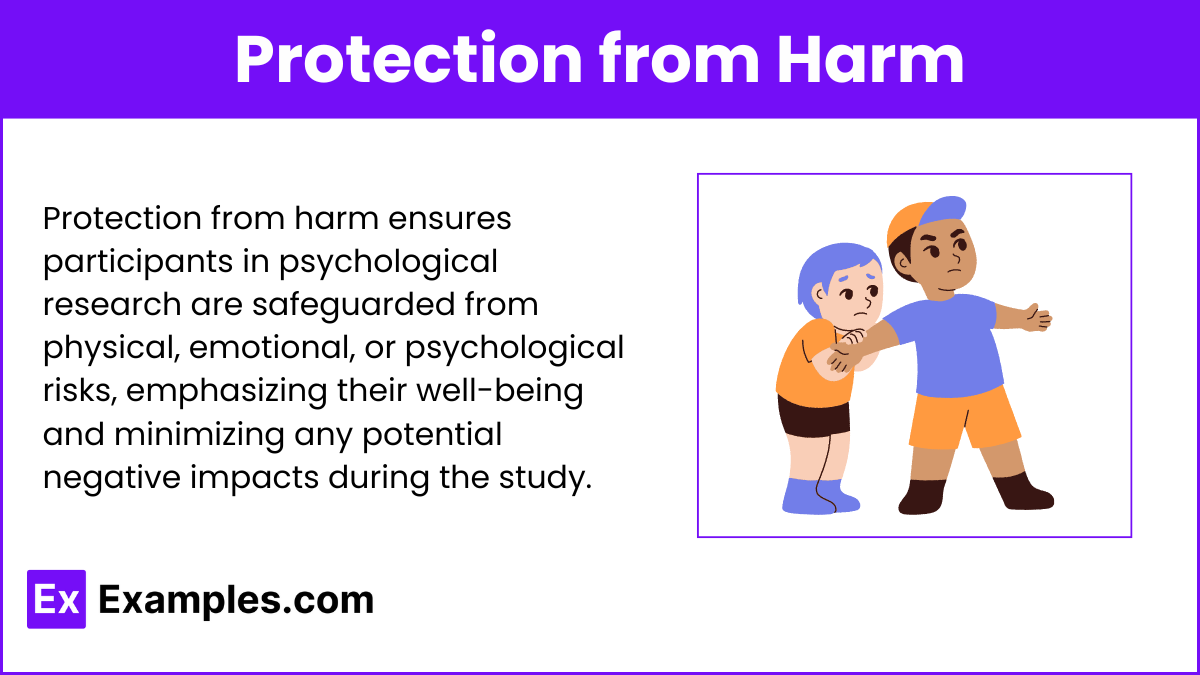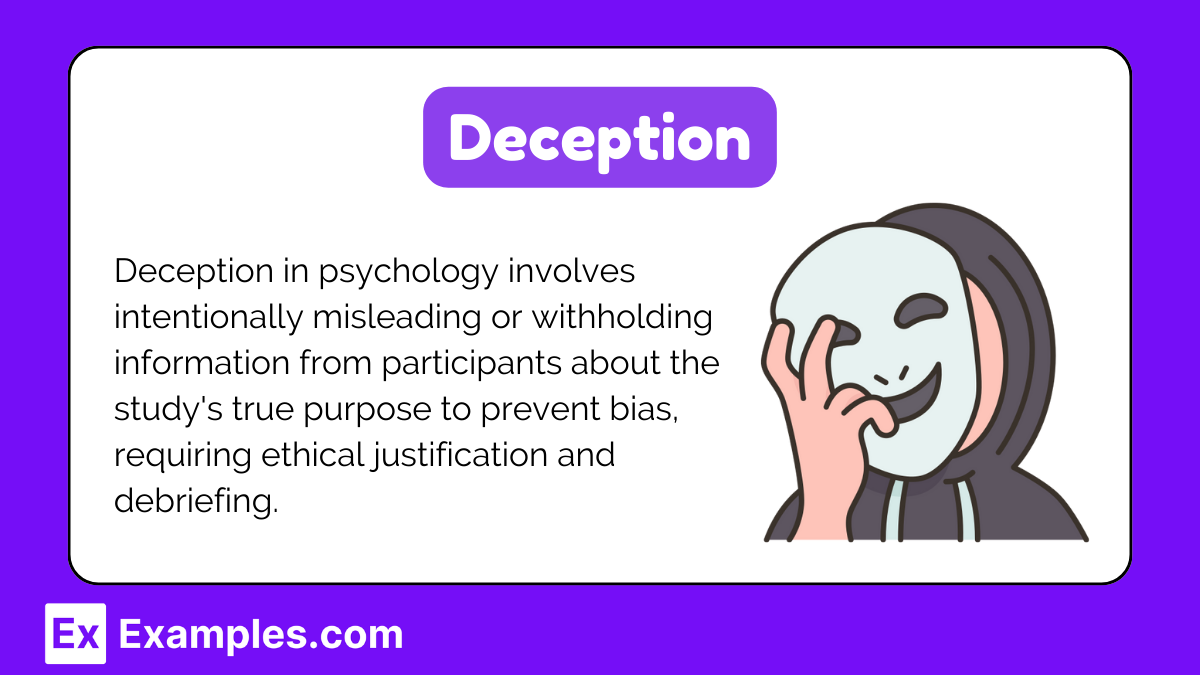In AP Psychology, understanding ethical guidelines is crucial for conducting and evaluating psychological research. These guidelines ensure the well-being, dignity, and protection of research participants. Key principles include informed consent, confidentiality, debriefing, protection from harm, use of deception, and voluntary participation. Ethical review boards (IRBs) oversee research proposals to ensure compliance with these standards. Mastering these concepts helps students appreciate the ethical considerations essential in psychological research and practice.
Learning Objectives
Learn key ethical principles informed consent, confidentiality, debriefing, protection from harm, use of deception, and voluntary participation. Understand the role of ethical review boards (IRBs). Analyze case studies to identify ethical issues and their impact on psychological research and practice.
Key Ethical Principles
1. Informed Consent
Informed consent is a foundational ethical principle in psychology, ensuring that participants are fully aware of the nature, purpose, and potential risks involved in a study before agreeing to take part. This principle is essential for protecting participants' autonomy and rights.
Key Elements of Informed Consent
Full Disclosure:
Researchers must provide comprehensive information about the study, including its objectives, procedures, potential risks, benefits, and the duration of participation.
Participants should be informed about the nature of the research and any potential discomfort or adverse effects they might experience.
Comprehension:
Information should be presented in a language and manner that is easily understandable to the participants.
Researchers must ensure that participants truly comprehend the information provided. This may involve assessing their understanding through questions or discussions.
Voluntariness:
Participation must be entirely voluntary, without any form of coercion or undue influence.
Participants should feel free to decline participation or withdraw from the study at any point without facing any negative consequences or penalties.
Competence:
Participants must have the cognitive ability to make an informed decision about their participation.
Special considerations are necessary for vulnerable populations, such as minors, individuals with cognitive impairments, or those under duress. In such cases, consent may need to be obtained from a legal guardian or representative.
Process of Obtaining Informed Consent
Information Session:
Researchers typically conduct an information session where they explain the study in detail, addressing all key elements of informed consent.
Participants are given the opportunity to ask questions and seek clarification about any aspects of the study.
Documentation:
A written consent form is usually provided, outlining all the relevant information discussed during the information session.
Participants read, understand, and sign the consent form to indicate their agreement to participate.
The consent form should include contact information for the researchers and ethical review board in case participants have further questions or concerns.
Ongoing Process:
Informed consent is not a one-time event but an ongoing process. Researchers must provide updates and seek renewed consent if there are significant changes to the study or its procedures.
Participants should be reminded of their right to withdraw at any time.
Ethical Considerations
Deception:
If deception is necessary for the study’s validity, researchers must ensure that it does not harm participants and that they are debriefed as soon as possible.
The ethical review board must approve the use of deception, and researchers should justify why it is necessary and how they will mitigate any potential harm.
Confidentiality:
Researchers must inform participants about how their data will be used, stored, and protected.
Participants should know who will have access to their information and how their confidentiality will be maintained.
Risks and Benefits:
Researchers must conduct a thorough risk-benefit analysis and communicate these findings to participants.
Any potential risks should be minimized, and participants should be aware of any benefits they might receive from participating in the study.
2. Confidentiality
Confidentiality is a crucial ethical principle in psychology, ensuring that participants' personal information and data are protected and not disclosed without their consent. It is fundamental for maintaining trust between researchers and participants, safeguarding participants' privacy, and adhering to ethical research standards.
Key Aspects of Confidentiality
Data Protection:
Researchers must take appropriate measures to protect participants' data from unauthorized access, loss, or theft.
This includes physical security measures (e.g., locked cabinets for paper records) and digital security measures (e.g., encryption, secure passwords for electronic data).
Anonymization:
Whenever possible, researchers should anonymize data to prevent the identification of individual participants.
This can involve removing or coding personal identifiers, such as names, addresses, or other unique characteristics.
Limited Access:
Only authorized personnel involved in the research should have access to participants' data.
Researchers must ensure that anyone with access to confidential information understands and adheres to confidentiality protocols.
Clear Communication:
Researchers must inform participants about how their data will be used, stored, and shared.
Participants should be aware of who will have access to their information and the steps taken to ensure its confidentiality.
Confidentiality Agreements:
Researchers and any team members with access to confidential data should sign confidentiality agreements.
These agreements outline the responsibilities and obligations regarding the handling and protection of participants' information.
Confidentiality in Practice
Informed Consent Process:
During the informed consent process, researchers must explain the confidentiality measures in place.
Participants should understand the extent of confidentiality and any limitations (e.g., legal obligations to report certain issues).
Data Storage:
Data should be stored securely, both physically and electronically.
Physical records should be kept in locked cabinets, while electronic data should be stored on secure servers with encryption and password protection.
Data Sharing:
When sharing data for publication or collaboration, researchers must ensure that the data is anonymized and that confidentiality is maintained.
Any sharing of identifiable data should be done with the explicit consent of participants.
Reporting and Publication:
In research reports and publications, researchers must ensure that individual participants cannot be identified.
Pseudonyms or aggregate data should be used to protect participants' identities.
Ethical Considerations
Legal Obligations:
In some cases, researchers may have legal obligations to breach confidentiality, such as reporting child abuse, threats of harm to self or others, or other mandatory reporting requirements.
Researchers must inform participants of these limitations to confidentiality during the consent process.
Sensitive Data:
Research involving sensitive data (e.g., medical records, criminal history) requires additional precautions to protect confidentiality.
Researchers must be particularly diligent in ensuring that such data is securely stored and only accessible to authorized personnel.
Secondary Data Use:
If researchers intend to use data for purposes beyond the original study, they must obtain additional consent from participants.
Participants should be informed about how their data will be used in the future and their rights regarding secondary data use.
3. Debriefing
Debriefing is an essential ethical process in psychological research, conducted after a study's completion to inform participants about the study's true nature, purpose, and any deception involved. It ensures that participants leave the study without harm and with a full understanding of their contribution.
Key Elements of Debriefing
Disclosure of Study Purpose:
Researchers explain the actual aims and hypotheses of the study.
Participants are informed about how their data will contribute to the research.
Explanation of Procedures:
A detailed description of the procedures used in the study, including any tasks or assessments participants completed.
Clarification of why certain methods were necessary.
Revealing Deception:
If deception was used, researchers must disclose and justify it during debriefing.
Participants should understand why deception was necessary and how it was essential for the study’s validity.
Addressing Participant Concerns:
Researchers provide a forum for participants to ask questions and express any concerns.
Participants should feel heard and reassured about their involvement.
Ensuring Participant Well-being:
Researchers assess and address any psychological distress or discomfort caused by the study.
Providing referrals for professional support if necessary.
Educational Value:
Debriefing serves as an educational opportunity, helping participants understand psychological research and its implications.
Participants learn about the scientific process and the importance of their contribution.
Process of Debriefing
Timing:
Debriefing should occur immediately after the participant's involvement in the study.
In cases where immediate debriefing might affect other participants (e.g., in ongoing studies), researchers should provide a thorough debriefing as soon as possible after the study concludes.
Format:
Debriefing can be conducted verbally, in writing, or both.
Written debriefing forms should complement verbal explanations, ensuring participants have a permanent record of the information.
Content:
Clear and concise explanations of the study's purpose, methods, and any deception used.
An overview of findings if available, or how participants will be informed of the results once the study is completed.
Follow-up:
Providing contact information for researchers in case participants have further questions or concerns.
Informing participants about when and how they will receive updates on the study's outcomes.
Ethical Considerations
Mandatory Debriefing:
Debriefing is mandatory for studies involving deception or potential psychological impact.
Ethical review boards (IRBs) require debriefing plans as part of the research approval process.
Transparency and Honesty:
Researchers must be transparent and honest during debriefing, fully disclosing any deception and its necessity.
Participants should leave the study with a clear understanding of the research and their role.
Minimizing Harm:
Debriefing aims to mitigate any negative effects of the study, ensuring participants' psychological well-being.
Researchers must be prepared to provide appropriate support or referrals if participants experience distress.
4. Protection from Harm
Protection from harm is a fundamental ethical principle in psychological research, ensuring that participants are not exposed to unnecessary risks or discomfort. This principle safeguards participants' physical and psychological well-being throughout the research process.
Key Elements of Protection from Harm
Risk Assessment:
Before a study begins, researchers must conduct a thorough assessment of potential risks to participants.
This includes identifying physical, emotional, social, and psychological risks.
Minimization of Risks:
Researchers must take all necessary steps to minimize potential risks and ensure participant safety.
This involves designing the study to avoid unnecessary stress, discomfort, or harm.
Informed Consent:
Participants should be fully informed about any potential risks involved in the study.
They must consent to participate with a clear understanding of these risks.
Ongoing Monitoring:
Researchers should continuously monitor participants for signs of distress or harm during the study.
Immediate action should be taken if any issues arise, including providing support and, if necessary, terminating participation.
Post-Study Support:
After the study, researchers should provide resources or referrals for participants who may need additional support.
Follow-up care may be necessary for participants experiencing adverse effects.
Ethical Guidelines for Protection from Harm
Institutional Review Board (IRB) Approval:
Research studies must be reviewed and approved by an IRB or ethics committee.
The IRB ensures that potential risks are justified and minimized and that participants are adequately protected.
Ethical Study Design:
Studies should be designed to avoid exposing participants to unnecessary risks.
Alternatives should be considered to achieve research objectives without compromising participant safety.
Clear Communication:
Researchers must communicate potential risks to participants in clear, understandable language.
Participants should know what to expect and have the opportunity to ask questions and seek clarification.
Voluntary Participation and Right to Withdraw:
Participation must be voluntary, and participants should be reminded that they can withdraw at any time without penalty.
This ensures that participants do not feel obligated to continue if they experience discomfort or distress.
5. Deception
Deception in psychological research involves intentionally withholding information or providing false information to participants about certain aspects of the study. While generally avoided due to ethical concerns, deception can sometimes be necessary to maintain the study's integrity and obtain valid results. However, its use must be carefully justified and managed to protect participants' rights and well-being.
Key Elements of Deception
Purpose of Deception:
Deception is employed to prevent participants from altering their behavior in ways that could invalidate the study’s results.
It may involve misleading participants about the true nature of the study or withholding specific details.
Justification:
Researchers must provide a strong scientific rationale for using deception, demonstrating that the study's potential benefits outweigh any risks.
Deception should only be used when no viable alternative methods are available to achieve the study's objectives.
Minimizing Harm:
Researchers must ensure that the deception does not cause significant physical or psychological harm to participants.
Measures should be in place to mitigate any potential negative effects.
Debriefing:
Full disclosure must be provided to participants after their involvement in the study, explaining the true nature and purpose of the research.
Debriefing should address any misconceptions and ensure participants leave with a clear understanding of the study.
Ethical Guidelines for Using Deception
IRB Approval:
Institutional Review Boards (IRBs) must review and approve the use of deception in research studies.
Researchers must provide a detailed justification for the deception and outline how they will protect participants’ well-being.
Informed Consent with Deception:
Participants should be informed that some details of the study may be withheld initially, but they will receive complete information afterward.
Consent forms should indicate that deception is involved without revealing specifics that could compromise the study.
Voluntary Participation:
Even with deception, participants’ involvement must be voluntary.
Participants should know they can withdraw at any time without penalty, even if they are unaware of the full details during the study.
Limited Deception:
Deception should be as minimal as possible, only covering aspects necessary to achieve the study's objectives.
The withheld information should not involve significant risks to the participants’ well-being.
Ethical Considerations
Potential Harm:
Researchers must thoroughly assess and minimize any potential harm caused by deception.
They should be prepared to provide support and resources to participants if they experience distress during debriefing.
Debriefing Process:
Debriefing should be thorough, transparent, and conducted as soon as possible after participation.
Participants should have the opportunity to ask questions and express any concerns about the deception used.
Trust and Integrity:
While deception can be a valuable tool in research, it must be balanced with the need to maintain trust and integrity in the researcher-participant relationship.
Researchers should consider the long-term impact of deception on participants' trust in psychological research.
6. Voluntary Participation

Voluntary participation is a fundamental ethical principle in psychological research, ensuring that participants engage in studies of their own free will, without any form of coercion or undue influence. This principle protects participants' autonomy and integrity, promoting ethical standards in research practices.
Key Elements of Voluntary Participation
Freedom to Choose:
Participants must willingly decide to participate in a study.
They should not feel forced, pressured, or manipulated into taking part.
Right to Withdraw:
Participants have the right to withdraw from the study at any time without penalty.
Researchers must clearly communicate this right and respect participants' decisions to leave the study.
Lack of Coercion:
Researchers must avoid any form of coercion, such as financial inducements that are too attractive or threats of negative consequences for not participating.
Participation should not be tied to services or benefits that participants need.
Informed Decision:
Participants should make their decision based on a full understanding of the study, including its purpose, procedures, potential risks, and benefits.
The informed consent process is essential for ensuring voluntary participation and serves as a critical reference for ethical research practices.
Ensuring Voluntary Participation
Clear Communication:
Researchers must provide clear, comprehensive information about the study, ensuring that participants understand what participation entails through an open negotiation process.
Information should be presented in a language and format that is accessible and understandable to all potential participants.
Consent Forms:
Written consent forms should outline the study's details, emphasizing the voluntary nature of participation and the right to withdraw.
Participants should have the opportunity to ask questions and seek clarification before signing the consent form.
Avoiding Pressure:
Researchers should create an environment where participants feel comfortable making their own decisions.
This includes avoiding any language or actions that might make participants feel obligated to participate.
Ethical Incentives:
While incentives can be used to encourage participation, they should not be so large that they become coercive.
Incentives should be appropriate to the time and effort required and should be ethically justified.
Ethical Considerations
Vulnerable Populations:
Special care is needed when working with vulnerable populations, such as children, prisoners, or individuals with cognitive impairments.
For these groups, additional safeguards and flexibility should be in place to ensure that participation is truly voluntary.
Power Dynamics:
Researchers should be aware of and mitigate power dynamics that might influence participants' decisions.
This is particularly important in situations where researchers hold authority or influence over potential participants, as it helps mitigate ethical issues.
Transparency and Honesty:
Transparency about the study’s aims and methods helps participants make informed, voluntary decisions, which is fundamental to research ethics.
Researchers must be honest about any potential risks and benefits associated with participation.
Ethical Review Boards
Ethical review boards, also known as Institutional Review Boards (IRBs), review research proposals to ensure they comply with ethical guidelines.
IRBs assess potential risks and benefits.
They ensure that researchers have taken appropriate steps to protect participants.
Researchers must obtain IRB approval before commencing their studies.







